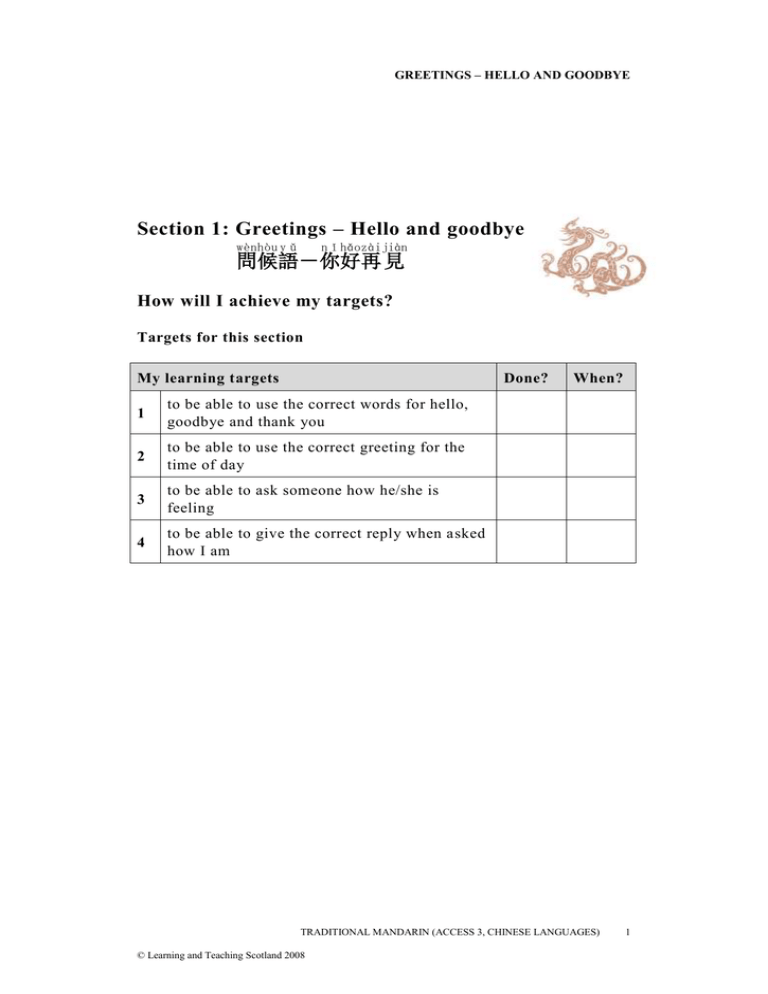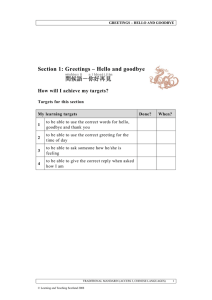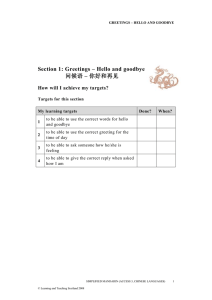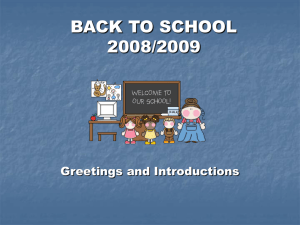Section 1: Greetings – Hello and goodbye 問 候
advertisement

GREETINGS – HELLO AND GOODBYE Section 1: Greetings – Hello and goodbye wèn hòu y ǔ n ǐ hǎo zàijiàn 問候語-你好再 見 How will I achieve my targets? Targets for this section My learning targets Done? 1 to be able to use the correct words for hello, goodbye and thank you 2 to be able to use the correct greeting for the time of day 3 to be able to ask someone how he/she is feeling 4 to be able to give the correct reply when asked how I am When? TRADITIONAL MANDARIN (ACCESS 3, CHINESE LANGUAGES) © Learning and Teaching Scotland 2008 1 GREETINGS – HELLO AND GOODBYE Key words for this section Mandarin English zàijiàn 再 見 bye bye xièxie 謝謝 thank you n ǐ hǎo m a 你 好 嗎? wǒ hěn hǎo 我 很 好。 wǎnshang hǎo 晚 上 好 wǎn ān 晚 安 xià w ǔ hǎo 下午 好 zǎoshanghǎo 早 上 好 zǎo ān 早 安 nǐ hǎo 你 好 How are you? I’m fine/I am very well Good evening 好 hǎo le 太 好 了! bú tài hǎo 不 太 好 háihǎo m a 還 好 嗎? bù hǎo 不 好 hěn zāo 很 糟 tài good great not too good How are things? bad/not good terrible nǐne Good night Good afternoon 你呢? hái hǎo 還 好 And you? not bad; so, so; alright n ǚ shì Good morning 女士 Ms (Miss or Mrs) xiǎojiě hello hēi 小 姐 Miss tàitai hi 嗨 qǐng 太太 Mrs xiānshēng please 請 先 生 tàibàng l e 太 棒 了! 2 English hǎo goodbye bàibai 拜拜 Mandarin awesome TRADITIONAL MANDARIN (ACCESS 3, CHINESE LANGUAGES) © Learning and Teaching Scotland 2008 Mr/sir GREETINGS – HELLO AND GOODBYE Exercise 1.1 On the recording you will hear some people speaking in Mandarin: which greetings are they using? Put a tick in the box under the greeting used by each person. Have a good day Goodbye Hi Good evening Good night Hello Person 1 Person 2 Person 3 Person 4 Person 5 My score TRADITIONAL MANDARIN (ACCESS 3, CHINESE LANGUAGES) © Learning and Teaching Scotland 2008 3 GREETINGS – HELLO AND GOODBYE Exercise 1.2 Here is the English for what the next people on the recording are saying – but it’s not in the same order as what you will hear. Put the order of the recorded words in the box after their English meaning. English meaning 1 How are you? 2 Great! 3 Fine, thanks! 4 Not very well. 5 Awesome! 6 Not bad. 7 Terrible! Order said My score 4 TRADITIONAL MANDARIN (ACCESS 3, CHINESE LANGUAGES) © Learning and Teaching Scotland 2008 GREETINGS – HELLO AND GOODBYE Exercise 1.3 Listen to the six people speaking on the recording. The names of the people they are talking to are printed below. What was said to them? Write down in English the word or phrase you hear being spoken to them. Choose from: hello how are you? good evening great good morning goodbye Andrew Peter Dalong Jamie Maria Peilan ā n zhú bǐdé d à lóng jié m ǐ mǎlìyà pèilán 安竹 彼德 大龍 杰米 瑪麗亞 佩蘭 1 2 3 4 5 6 My score TRADITIONAL MANDARIN (ACCESS 3, CHINESE LANGUAGES) © Learning and Teaching Scotland 2008 5 GREETINGS – HELLO AND GOODBYE Exercise 1.4 Listen to the next ten people; who are they speaking to – Mr, Mrs or Miss? Put the number of the conversation beside the titles in the grid below as you listen. The first one is done for you. Title Used in numbers… Mr Mrs 1 Miss My score 6 TRADITIONAL MANDARIN (ACCESS 3, CHINESE LANGUAGES) © Learning and Teaching Scotland 2008 GREETINGS – HELLO AND GOODBYE Exercise 1.5 Put the words Mr, Mrs or Miss in the correct box below the greeting said in each sentence on the recording. Have a good day Good night Good Good evening afternoon Good morning Hello Alright 1 2 3 4 5 My score TRADITIONAL MANDARIN (ACCESS 3, CHINESE LANGUAGES) © Learning and Teaching Scotland 2008 7 Not very well GREETINGS – HELLO AND GOODBYE Mandarin spoken here! Your teacher/lecturer will ask you what your response could be in Mandarin in at least two of the situations below: At 11.00pm you go off to bed You greet your best pal on the way to school You get a present from your grandparents You leave your friends to go home 1 2 3 4 In the conversations below, give the best answer in Mandarin to whatever the teacher/lecturer says: he/she might suggest a possible reply like this: (not bad). 1. Teacher/lecturer: Hello! You: You: 3. 2. Teacher/lecturer: Good evening Teacher/lecturer: How are you? You: 4. Teacher/lecturer: How are you? You: (alright) 5. Teacher/lecturer: How are things? You: 6. Teacher/lecturer: How are you? You: (not very well) 8 (not bad) (fine thanks) TRADITIONAL MANDARIN (ACCESS 3, CHINESE LANGUAGES) © Learning and Teaching Scotland 2008 GREETINGS – HELLO AND GOODBYE My mini dictionary Mandarin zàijiàn 再 見 bài bai 拜 拜 xièxie 謝謝 nǐ hǎo m a 你 好 嗎? hǎo 好 hěn hǎo 很 好 tài hǎo le 太 好 了 háihǎo OK, 還 好 bù hǎo 不 好 bú tài hǎo 不 太 好 English goodbye bye bye thank you How are you? good very well great OK, alright bad not very good Mandarin xiān sheng 先 生 tài tai 太 太 xiǎo jiě 小 姐 nǐ hǎo 你 好 hēi 嗨 nǐ ne 你 呢? zǎo shang hǎo 早 上 好 or zǎo ān 早 安 xià wǔ hǎo 下 午 好 or wǔ ān 午 安 wǎn shang hǎo 晚 上 好 wǎn ān 晚 安 English Mr Mrs Miss hello hi And you? good morning good afternoon good evening good night TRADITIONAL MANDARIN (ACCESS 3, CHINESE LANGUAGES) © Learning and Teaching Scotland 2008 9 GREETINGS – HELLO AND GOODBYE Questions and answers When people have a conversation, it is often in the form of question and answer: one person asks a question and the other gives an answer. Here are the important questions and answers in this lesson. Try to remember them. wèn Question 问 dá Answer 答 How are you? nǐhǎoma 你 好 嗎? I’m fine, thank you. wǒ hěn hǎo xièxie 我 很 好,謝 謝。 Not too good. bú tài hǎo 不 太 好 Not bad. háihǎo 還 好 10 TRADITIONAL MANDARIN (ACCESS 3, CHINESE LANGUAGES) © Learning and Teaching Scotland 2008



